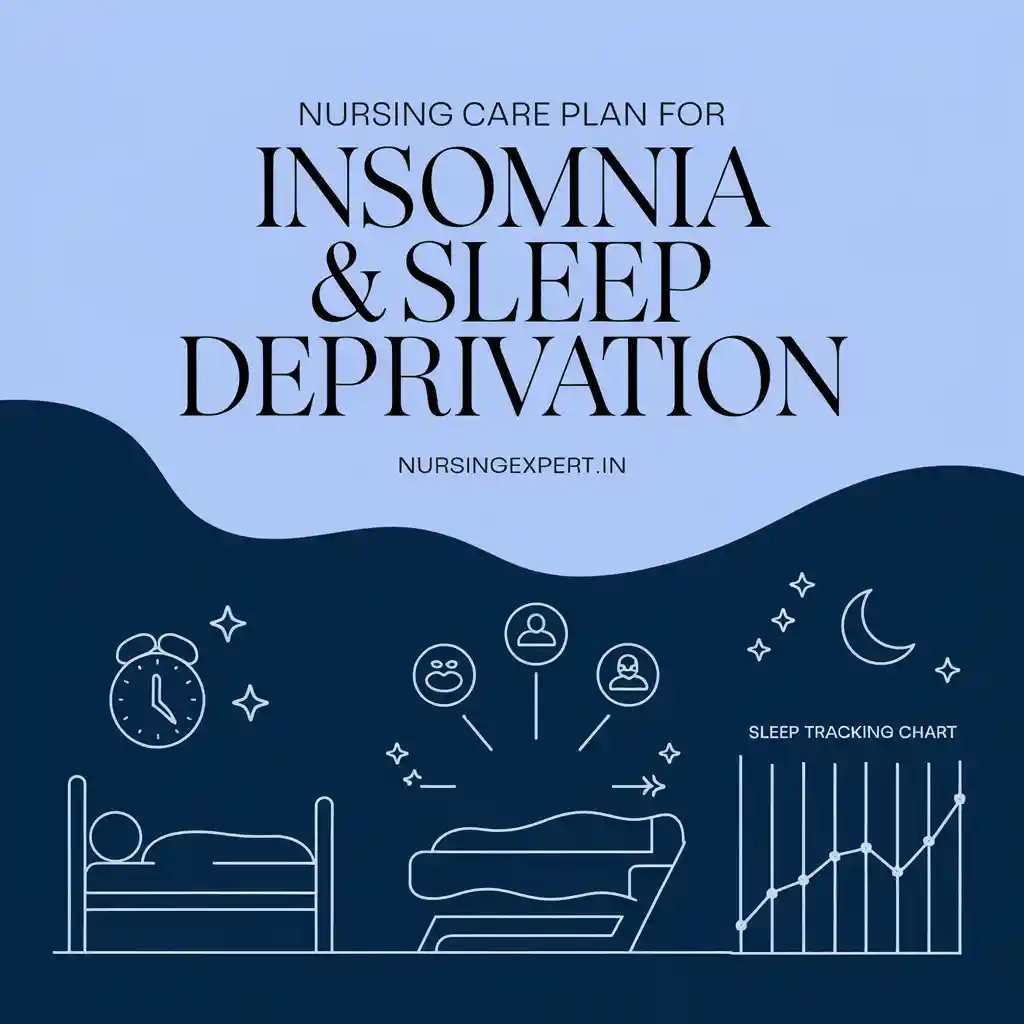A good night’s sleep is vital for overall health. Our Nursing Care Plan for Insomnia & Sleep Deprivation provides a clear framework to assess sleep issues, implement practical interventions, and educate patients on effective sleep hygiene. This plan helps you address sleep disturbances, reduce anxiety, and promote restorative sleep, ensuring better health outcomes for your patients.
Thank you for reading this post, don't forget to subscribe!
1. Introduction
Sleep is vital for good health. Many patients struggle with insomnia or sleep deprivation. These conditions can lower energy, affect mood, and weaken overall health. This care plan guides you through assessing sleep issues and applying practical interventions. Use this plan to help your patients gain better sleep and improve their daily lives.


2. Understanding Insomnia & Sleep Deprivation
Insomnia means a patient has trouble falling asleep, staying asleep, or both. Sleep deprivation happens when a patient does not get enough sleep. These problems may occur for a few days or last a long time. Poor sleep can lead to fatigue, mood changes, and difficulty thinking clearly. You can help patients understand how sleep affects their health and encourage healthy sleep habits.
3. Etiology and Risk Factors
Many factors can cause insomnia and sleep deprivation. Common factors include:
- Stress and Anxiety: Emotional stress makes it hard to relax and sleep.
- Medical Conditions: Pain, breathing issues, or digestive problems can disturb sleep.
- Medications: Some drugs, such as stimulants or certain antidepressants, may disrupt sleep.
- Lifestyle Choices: Irregular schedules, too much screen time, caffeine, and low physical activity can interfere with sleep.
- Environmental Factors: Noise, light, and uncomfortable room temperatures affect sleep quality.
- Substance Use: Alcohol and drugs may lead to poor sleep quality despite initial drowsiness.
Understanding these factors lets you address the root causes of sleep problems.
4. Signs and Symptoms for Insomnia & Sleep Deprivation
Watch for these signs when assessing a patient:
- The patient reports trouble falling asleep or staying asleep.
- The patient feels tired during the day.
- The patient shows irritability or mood changes.
- The patient experiences memory lapses or poor concentration.
- The patient suffers from headaches or muscle tension.
Early recognition of these symptoms helps you start the right interventions.
5. Nursing Diagnoses for Insomnia & Sleep Deprivation
Use the following nursing diagnoses based on NANDA guidelines:
- Disturbed Sleep Pattern related to difficulty falling or staying asleep, as reported by the patient.
- Fatigue related to inadequate sleep, shown by low energy and poor concentration.
- Anxiety related to fear of not getting enough sleep, as seen in restlessness.
- Ineffective Coping related to stress and sleep loss, seen in poor decision-making.
- Deficient Knowledge regarding sleep hygiene and relaxation techniques, as shown by irregular sleep habits.
These diagnoses help you set clear goals and choose proper interventions.
6. Nursing Interventions for Insomnia & Sleep Deprivation
Apply these targeted interventions to improve sleep quality:
1. Assess Sleep Patterns and Environment
- Action: Ask the patient to keep a sleep log or use a wearable device.
- Benefit: You can determine sleep quality, duration, and factors that disturb sleep.
2. Educate on Sleep Hygiene
- Action: Explain the importance of a regular sleep schedule, a dark and quiet room, and avoiding screens before bed.
- Benefit: Good sleep habits create a better sleep environment.
3. Implement Relaxation Techniques
- Action: Teach deep breathing, progressive muscle relaxation, or guided imagery.
- Benefit: These techniques lower anxiety and prepare the body for sleep.
4. Use Cognitive Behavioral Strategies
- Action: Introduce simple cognitive techniques to help the patient replace negative thoughts with positive ones.
- Benefit: Changing thought patterns can lead to better sleep.
5. Optimize the Sleep Environment
- Action: Suggest measures such as dimming lights, reducing noise, and maintaining a cool room temperature.
- Benefit: A comfortable environment supports uninterrupted sleep.
6. Review Medications
- Action: Check the patient’s current medications with the healthcare team.
- Benefit: Adjusting medications may reduce sleep disruption.
7. Follow-Up and Monitor Progress
- Action: Schedule regular sessions to review the sleep log and patient feedback.
- Benefit: Monitoring progress ensures that you can adjust the plan as needed.
7. Nursing Management Strategies
Adopt these strategies to guide patients from assessment to improved sleep:
Initial Comprehensive Assessment
- Action: Record the patient’s sleep patterns and contributing factors.
- Benefit: A detailed baseline supports effective goal setting.
Continuous Monitoring
- Action: Regularly review sleep logs and ask for patient feedback.
- Benefit: Frequent checks help you detect changes and adjust interventions.
Early Intervention
- Action: Start supportive measures as soon as sleep issues are identified.
- Benefit: Early action prevents the problem from worsening.
Patient-Centered Education
- Action: Provide easy-to-read materials on sleep hygiene and relaxation.
- Benefit: Informed patients are more likely to follow healthy sleep routines.
Regular Follow-Up
- Action: Set up follow-up sessions to track progress.
- Benefit: Ongoing reviews keep the care plan effective over time.
Interdisciplinary Collaboration
- Action: Work with physicians, mental health experts, and sleep specialists.
- Benefit: A team approach ensures all aspects of sleep health are addressed.
8. Patient and Family Education
Educate your patient and family using these simple methods:
- Explain the Role of Sleep: Tell them how good sleep improves health, mood, and focus.
- Teach Sleep Hygiene: Show them how to maintain a regular sleep routine and create a calm sleep environment.
- Introduce Relaxation Techniques: Demonstrate exercises like deep breathing.
- Discuss Diet and Exercise: Explain how healthy eating and regular exercise promote better sleep.
- Encourage Family Support: Involve family members in helping the patient stick to a sleep routine.
- Provide Written Materials: Offer brochures or handouts that summarize key points.
Clear education empowers patients and helps them manage their sleep better.
9. Interdisciplinary Collaboration
You can improve patient outcomes by working with other professionals:
- Physicians and Sleep Specialists: They assess medical causes and adjust medications.
- Mental Health Professionals: They provide cognitive behavioral therapy and manage anxiety.
- Pharmacists: They review medication effects on sleep.
- Occupational Therapists: They help set up daily routines that support sleep.
- Patient Educators: They reinforce sleep hygiene and relaxation techniques.
This team approach offers comprehensive support for sleep improvement.
10. Sample Nursing Care Plan for Insomnia & Sleep Deprivation
Below is a sample care plan for patients with insomnia and sleep deprivation:
| Assessment | Nursing Diagnosis | Goal/Expected Outcome | Intervention/Planning | Implementation | Rationale | Evaluation |
|---|---|---|---|---|---|---|
| Subjective Data: – The patient reports difficulty falling asleep and frequent night awakenings. Objective Data: – The patient appears tired during the day and shows reduced concentration. | Disturbed Sleep Pattern related to difficulty falling and staying asleep, as reported by the patient. | Short-Term: – Within 48 hours, the patient will reduce sleep latency by 30 minutes. Long-Term: – The patient will sleep 6–7 uninterrupted hours per night and feel more alert during the day. | Educate the patient on sleep hygiene; introduce relaxation techniques; adjust the sleep environment. | Provide both verbal and written instructions; demonstrate relaxation exercises; modify the sleep area (dim lights, lower noise). | A proper sleep environment and consistent habits lower sleep latency and improve sleep quality. | The patient reports faster sleep onset and increased sleep duration, confirmed by a sleep log. |
| Subjective Data: – The patient feels anxious about not getting enough sleep. Objective Data: – The patient shows signs of restlessness and verbalizes worry. | Anxiety related to fear of sleep deprivation, as shown by patient reports and restlessness. | Short-Term: – Within 24 hours, the patient will identify one method to reduce anxiety. Long-Term: – The patient will report lower anxiety levels and improved sleep within one week. | Teach relaxation and cognitive restructuring techniques; provide counseling referrals; involve the family for support. | Guide the patient through relaxation exercises; schedule counseling sessions; document emotional changes. | Reducing anxiety helps break the cycle of worry and poor sleep. | The patient reports reduced anxiety and uses coping strategies effectively. |
11. Downloadable PDF Resource
Access the complete nursing care plan for insomnia and sleep deprivation in a PDF format. This document provides step-by-step instructions, detailed diagnoses, and patient education strategies.
📥 Download the Nursing Care Plan for Insomnia & Sleep Deprivation PDF
12. Frequently Asked Questions (FAQs)
What Is Insomnia?
Insomnia is a sleep disorder where a patient has trouble falling asleep or staying asleep, leading to poor quality sleep.
How Does Sleep Deprivation Affect Health?
Sleep deprivation can cause fatigue, reduced concentration, mood changes, and an increased risk of chronic health problems.
What Are Key Nursing Interventions?
Key interventions include assessing sleep patterns, educating on sleep hygiene, using relaxation techniques, and managing anxiety with cognitive strategies.
How Do You Measure Success?
Success is measured by improved sleep onset, longer total sleep time, lower anxiety levels, and positive patient feedback on daytime function.
13. Conclusion
This nursing care plan offers you a focused approach to managing insomnia and sleep deprivation. Clear assessments, well-defined diagnoses, targeted interventions, and patient education are key to restoring quality sleep. Use this guide to empower your patients to achieve better sleep and improve their overall health.
14. References and Sources
- Mayo Clinic – Sleep Disorders
https://www.mayoclinic.org/diseases-conditions/insomnia/symptoms-causes/syc-20355167 - MedlinePlus – Insomnia
https://medlineplus.gov/insomnia.html - NANDA International – Nursing Diagnoses: Definitions and Classifications
https://nanda.org/ - National Sleep Foundation – Healthy Sleep Tips
https://www.sleepfoundation.org/ - American Nurses Association – Nursing Care Plans
https://www.nursingworld.org/


